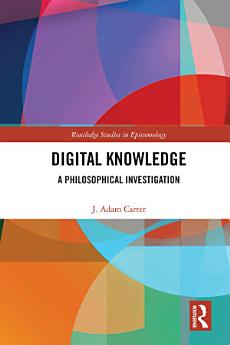Digital Knowledge: A Philosophical Investigation
About this ebook
Digital Knowledge: A Philosophical Investigation is the first book to squarely and rigorously investigate digital knowledge: what it is, how to make sense of it in connection with received theories of knowledge, and where it is going. Key questions J. Adam Carter examines along the way are the following:
- How is mere digital information converted into reliable digital knowledge?
- To what extent can digital knowledge be vindicated against sceptical challenges, and in what ways might digital knowledge stand distinctively subject to defeat?
- What is the epistemically optimal way for us to decide which tasks to outsource entirely to intelligent machines, and to what extent is further outsourcing appropriate (or not) to verify the results of that same outsourced cognition?
- Are there any ways in which the expansion of the datasphere threatens to make knowledge less, rather than more, easy to come by? If so, are there any promising ways to safeguard, epistemically, against such threats?
Using fascinating examples throughout, such as the recent chess match between Stockfish and Google’s AlphaZero, smartphones and personalisation, Digital Knowledge: A Philosophical Investigation is ideal for researchers investigating this fascinating area of research at the intersection of traditional mainstream epistemology, the philosophy of cognitive science, the philosophy of technology, and computer science.
About the author
J. Adam Carter is Professor of Philosophy at the University of Glasgow, UK, where he is the deputy director of the COGITO Epistemology Research Centre. His books The Philosophy of Group Polarization and The Epistemology of Group Disagreement (both with Fernando Broncano-Berrocal), and Well-Founded Belief: New Essays on the Epistemic Basing Relation (with Patrick Bondy), are also available from Routledge. He is also the author of Autonomous Knowledge (2022) and PI on an AHRC-funded project on digital epistemology (2022–2025).






